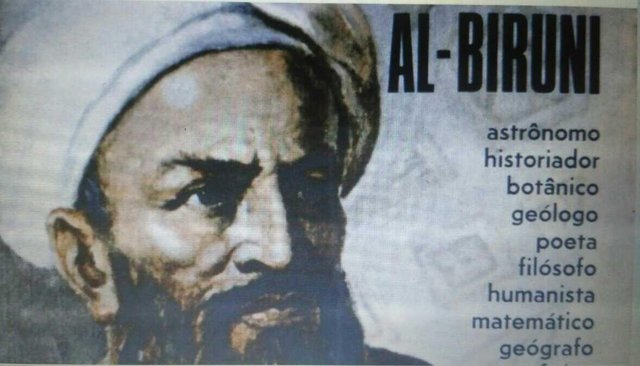Al Biruni

Born: September 4, 973 M, Kath (now Khiva), around the watershed of the Oxus River, Khwarizm (Uzbekistan)
Died: December 13, 1048 (75 years) in Ghazna
Fields: physics, anthropology, psychology, chemistry, astrology, history, geography, geodesy, mathematics, pharmacy, medicine, and philosophy.
Abu Rayhan Muhammed Ibn Ahmad Al-Biruni was a Persian who mastered various sciences such as; physics, anthropology, psychology, chemistry, astrology, history, geography, geodesy, mathematics, pharmacy, medicine, and philosophy. As a scientist who mastered a variety of sciences, he gave a great contribution to every science he mastered it. He is also known as a teacher who greatly admired his disciples.
Al-Biruni was born before dawn on 4 September 973 AD in the city of Kath - now is the city of Khiva - in the vicinity of the Oxus River stream, Khwarizm (Uzbekistan). History of his childhood is not too much known. In his biography, Al-Biruni admitted to not knowing his father at all, knew little of his grandfather.
Education and Capabilities
Al-Biruni able to master a series of languages such as Arabic, Turkish, Persian, Sanskrit, Jewish, and Syriac. Young Al-Biruni studied mathematics and Astronomy from Abu Nasir Mansur. By the age of 20, Al-Biruni has written several works in the field of science. He also frequently exchanged ideas and experiences with Abu Ali Al-Hussain Ibn Abdallah Ibn Sina / Ibn Sina - another great Muslim scholar who was so influential in Europe.
Al-Biruni grew up in an uncertain political situation. At the age of 20, the Khwarizmi Dynasty was overthrown by Emir Ma'mun Ibn Muhammad, from Gurganj. At that time, Al-Biruni sought refuge and took refuge at Sultan Nuh Ibnu Mansur's Palace. In 998 CE, the Sultan and Al-Biruni went to Gurgan in the Caspian Sea. He lived in the area for several years.
Writing book
During his stay in Gurgan, Al-Biruni has completed one of his works namely writing a book called The Chronology of Ancient Nations. About 11 years later, Al-Biruni returned to Khwarizmi. Upon his return from Gurgan he served as an advisor as well as a court official for Emir Ma'mun's emcee. In 1017 AD, the political situation again flared following the death of Emir Ma'mun's second child due to the rebellion.
Khwarizmi was invaded by Mahmud Ghazna in 1017 AD Mahmud then brought Khwarizmi Palace officials to strengthen his work which is based in Ghazna, Afghanistan. AL-Biruni is one of the scientists and officials of the palace who took part. In addition, other scientists who brought Mahmud to Ghazna is a mathematician, Ibnu Iraq, and a doctor, Ibn Khammar.
To improve the prestige of his palace, Mahmud deliberately attracted scholars and scientists to Ghazna Palace. Mahmud also did various ways to bring scientists into his territory. Ibn Sina also received a threatening invitation from Mahmud to come and develop the knowledge he possessed at Ghazna's court.
Although Mahmud seems impressed, but Al-Biruni enjoys his presence in Ghazna. In the palace, he was respected and freely able to develop the knowledge he mastered. One of Al-Biruni's tasks was to become an isatanic astrologist for Mahmud and his successor.
Go to India
In 1017 AD to 1030 AD, Al-Biruni got a chance to travel to India. For 13 years, the Muslim scholar was studying the ins and outs of India to give birth to what is called indology or the study of India. In the country of Hindustan, Al-Biruni collect a variety of materials for monumental research that he did. He extracts and gathers the history, customs, faithfulness or beliefs of the people in the Indian sub-continent.
During his lifetime, he also produced a major work in astronomy through Masudic Canon dedicated to Mahmud's son Ma'sud. For his work, Ma'sud presented a silver-filled elephant. However, Al-Biruni returned the gift he received to the state treasury.
As a form of appreciation, Ma'sud also guarantees Al-Biruni with pensions that can make him quiet rest and continue to develop science. He also managed to write an astrology book entitled The Elements of Astrology. In addition, the scientist also wrote a series of works in the field of medicine, geography, and physics. Al-Biruni died at the age of 75 precisely on 13 December 1048 AD in the city of Ghazna. To keep in mind his services, astronomers immortalize the name of Al-Biruni in the crater of the moon.